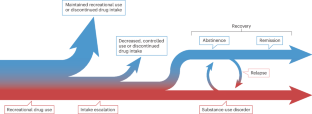Remission from addiction: erasing the wrong circuits or making new ones?
IF 28.7
1区 医学
Q1 NEUROSCIENCES
引用次数: 0
Abstract
Chronic relapse is a hallmark of substance-use disorders (SUDs), but many people with SUDs do recover and eventually enter remission. Many preclinical studies in this field aim to identify interventions that can precipitate recovery by reversing or erasing the neuronal circuit changes caused by chronic drug use. A better understanding of remission from SUDs can also come from preclinical studies that model factors known to influence recovery in humans, such as the negative consequences of drug use and positive environmental influences. In this Perspective we discuss human neuroimaging studies that have provided information about recovery from SUDs and highlight mechanisms identified in preclinical studies — such as the reconfiguration of neuronal circuits — that could contribute to remission. We also analyse how studies of memory and forgetting can provide insights into the mechanisms of remission. Overall, we propose that remission can be driven by the introduction of new neuronal changes (which outcompete those induced by drugs) as well as by the erasure of drug-induced changes. Substance-use disorders (SUDs) are characterized by chronic relapse. However, many of those affected eventually do achieve recovery. Engeln and Ahmed describe insights from clinical and preclinical studies of remission that suggest that recovery from substance-use disorders involves both reversal of drug-induced circuit changes and new neural circuit adaptations.


戒除成瘾:清除错误的回路还是制造新的回路?
长期复发是药物滥用障碍(SUDs)的一大特征,但许多 SUDs 患者确实能够康复并最终进入缓解期。该领域的许多临床前研究都旨在找出干预措施,通过逆转或消除长期吸毒造成的神经元回路变化来促进康复。临床前研究还可以模拟已知的影响人类康复的因素,如吸毒的负面影响和积极的环境影响,从而更好地理解药物依赖性精神障碍的缓解。在本《视角》中,我们将讨论人类神经影像学研究,这些研究提供了有关从药物滥用中康复的信息,并强调了临床前研究中发现的可能有助于缓解的机制,如神经元回路的重新配置。我们还分析了记忆和遗忘研究如何为缓解机制提供启示。总之,我们提出,缓解可以通过引入新的神经元变化(与药物诱导的变化竞争)以及消除药物诱导的变化来实现。
本文章由计算机程序翻译,如有差异,请以英文原文为准。
求助全文
约1分钟内获得全文
求助全文
来源期刊

Nature Reviews Neuroscience
NEUROSCIENCES-
自引率
0.60%
发文量
104
期刊介绍:
Nature Reviews Neuroscience is a multidisciplinary journal that covers various fields within neuroscience, aiming to offer a comprehensive understanding of the structure and function of the central nervous system. Advances in molecular, developmental, and cognitive neuroscience, facilitated by powerful experimental techniques and theoretical approaches, have made enduring neurobiological questions more accessible. Nature Reviews Neuroscience serves as a reliable and accessible resource, addressing the breadth and depth of modern neuroscience. It acts as an authoritative and engaging reference for scientists interested in all aspects of neuroscience.
 求助内容:
求助内容: 应助结果提醒方式:
应助结果提醒方式:


